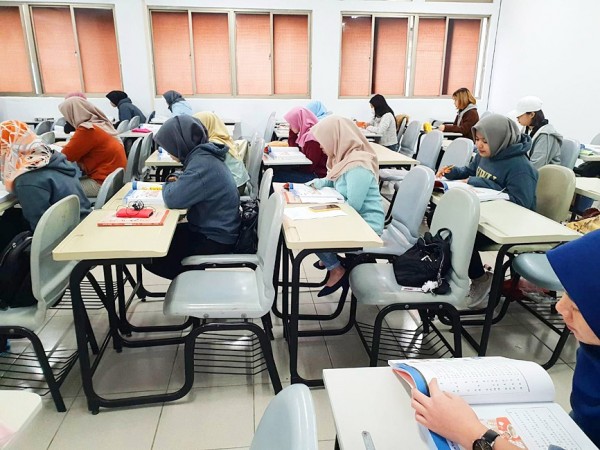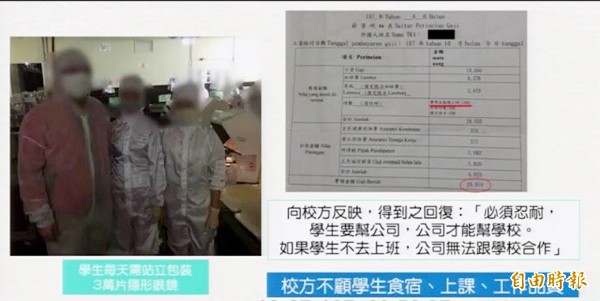《TAIPEI TIMES》 Foreign students ‘tricked’ into work

Students from Southeast Asian countries attend a Chinese lesson as part of an internship program at Hsing Wu University in New Taipei City’s Linkou District in an undated photograph. Photo courtesy of Hsing Wu University
TAKING ADVANTAGE: The Ministry of Education said it has since last year been aware that employment agencies are recruiting students under an internship program
By Ann Maxon / Staff reporter
Hundreds of Southeast Asian students recruited to Taiwanese universities under the government’s New Southbound Policy have allegedly been tricked into doing illegal work at factories, with some working 10 hours per day, Chinese Nationalist Party (KMT) Legislator Ko Chih-en (柯志恩) said yesterday.
At least six schools have allegedly collaborated with employment agencies and companies to make their students provide cheap labor, Ko told a meeting of the Legislative Yuan’s Education and Culture Committee.
One school, which she later identified as Hsing Wu University in New Taipei City’s Linkou District (林口), arranged for its students to work 10 hours per day, four days per week at an optics manufacturer, she said.
“They had to stand for 10 hours and package 30,000 contact lenses every day” and were banned from taking any leave, she said.
When students told the school about their work, it replied that they “must help the company so that the company can help the school,” she said.
The students were assigned to shabby dormitories in Hsinchu to be near their work, she said, adding that the rooms did not have desks.
“Two days a week, they would have to wake up at 5am and be driven to Linkou for classes on a bus [arranged by the school] that departs at 6am,” she said.
Employment agencies tricked many of the approximately 200 students into applying for the program through advertisements claiming that they would be offered free accommodation and meals, as well as a monthly salary of about NT$20,000 for “internship” work, Ko said.
However, after arriving, the students realized that starting from their sophomore year, they would need to pay more than NT$40,000 every semester for tuition, accommodation and other expenses, which placed them under great financial pressure, she said.
“This is not an isolated case, but a reoccurring pattern” that shows how schools, employment agencies and companies are taking advantage of the New Southbound Policy internship program designed to encourage students from Southeast Asia to take classes and complete internships, she said.
“Schools offer internship programs and receive subsidies from the Ministry of Education, and employment agencies trick students into joining the programs,” Ko said. “Schools then arrange for internships at companies, which pay employment agencies for introducing the workers.”
Many agencies have boasted about how students recruited under the program are more “useful” than migrant workers, as they are not subject to labor law restrictions, she said.
The ministry has been aware of the problem since last year and has warned schools against recruiting students through employment agencies, Acting Minister of Education Yao Leeh-ter (姚立德) said.
“Those found to have done so would lose subsidies and be banned from offering international internship programs and, in more serious cases, required to receive special consultation,” he said.
The ministry’s international internship program requires review, he added, promising to launch investigations into all schools involved.
Students can perform part-time work that is unrelated to their school work as long as it does not exceed 20 hours per week, he said.
“If students are exploited, we would definitely intervene,” he added.
Hsing Wu University did not recruit students through employment agencies and only helped arrange legal part-time work for students who needed income to cover their living expenses, university vice president Chen Yi-wen (陳義文) told reporters at a news conference after the meeting.
Companies have provided free accommodation to 25 students and compromised by exempting Indonesian students from night shifts for their prayers, university international section head Kuo An-min (國安民) said, adding that the students’ lives have turned “from black and white to full color” because of the program.
Additional reporting by Rachel Lin
新聞來源:TAIPEI TIMES

A slide showing evidence of alleged illegal labor practices at factories in Taiwan through exploitation of internship programs for Southeast Asian students is shown yesterday by Chinese Nationalist Party (KMT) Legislator Ko Chih-en at the Legislative Yuan in Taipei. Photo: Lin Hsiao-yun, Taipei Times












